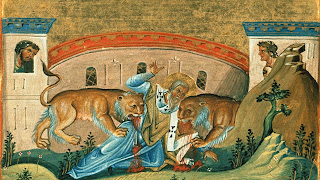Are You Prepared to Be Crucified?
Have you ever thought about why you do church the way you do? The Bible you carry and read, the ways you participate in a church service, and even the core essentials of your faith were not born from a vacuum. The church we belong to was birthed over 2,000 years ago in Acts chapter two. As protestant church goers, we tend to think and act like it started 500 years ago in the 1500's with the Protestant Reformation of Martin Luther, but the church was 1,500 years old by then.
I'll be quick to admit my knowledge of the growth of the early church after Acts chapter 28 is weak at best. At the end of Acts the Apostle Paul has been arrested and sent to Rome for trial. Acts doesn't record his execution, most likely because it was written before he died, but church history states he died by beheading just before the last year of the Roman Emporer Nero's reign in 68. But what happened within the church next?
If the church was a baby, we have a lot of baby pictures recorded in the Book of Acts to remind us of the major events, but what about the toddler years? The childhood period? Teenage and early adulthood? If we are to really know the church, the Body of Christ, how much can we know from only baby pictures and then full-grown pictures 1,500 to 2,000 years later? If we're really honest, most protestant Christians don't even know their own church history from the last 500 years. How well do you even know the history of the local church you belong to?
Even the topic of this post didn't drop out of the sky. There is a context, and context is important, especially in matters of faith and practice. I have been studying the early church in the Book of Acts in preparation for Pentecost Sunday a couple weeks ago. As I prepared my messages I came to realize I knew very little about what happened with the church after Acts 28. I was familiar with the baby pictures but there was a huge missing gap in my knowledge of what happened next? For the first time in my Christian life I began to feel an uneasy sense I didn't know the formative growing-up stages of the Body of Christ, the church, and I was missing something extremely important. That "something" was what God started in the New Testament believers he never stopped. He continued to guide men and women throughout church history to bring his church to the place it is today--in my world and time. I got the feeling my place in the growth and maturity of the church is due to the giants of the faith who came before me. It reminded me of Hebrews 12:1 which says, "Therefore, since we have so great a cloud of witnesses surrounding us..." For us, those witnesses are not just from the Old Testament but also those who bled and died for their Savior after the church was birthed and up until now. We are standing on their shoulders and don't even know their names or the suffering they endured because of their loyalty to Christ!
So I picked up a church history book on my shelf that has sat there for years gathering dust and unread and began reading. That book is "Tried by Fire: The Story of Christianity's First Thousand Years" by Willam J. Bennett. My first overwhelming impression was how much persecution and suffering many of the early believers endured. For them, the Scripture, "Take up your cross and follow me." (Matt 16:24), was not only a metaphor for suffering, but the cross and crucifixion were an impending threat and reality for being identified as a Christian. Would you be a follower of Christ if "take up your cross" was literal? Are you prepared to be crucified as Christ was?
The following is one example of the mindset and commitment required for the early church believers.
Ignatius of Antioch (AD 35-107), a personal disciple of the Apostle John, was a leader of the church in modern-day Turkey. He was arrested by the Roman Emporer Tragan who demanded he recount his loyalty to Christ and affirm the deity of the Roman gods. He refused. As he was being transported to Rome for trial and certain death he wrote a letter to the Christians in Rome.

Comments